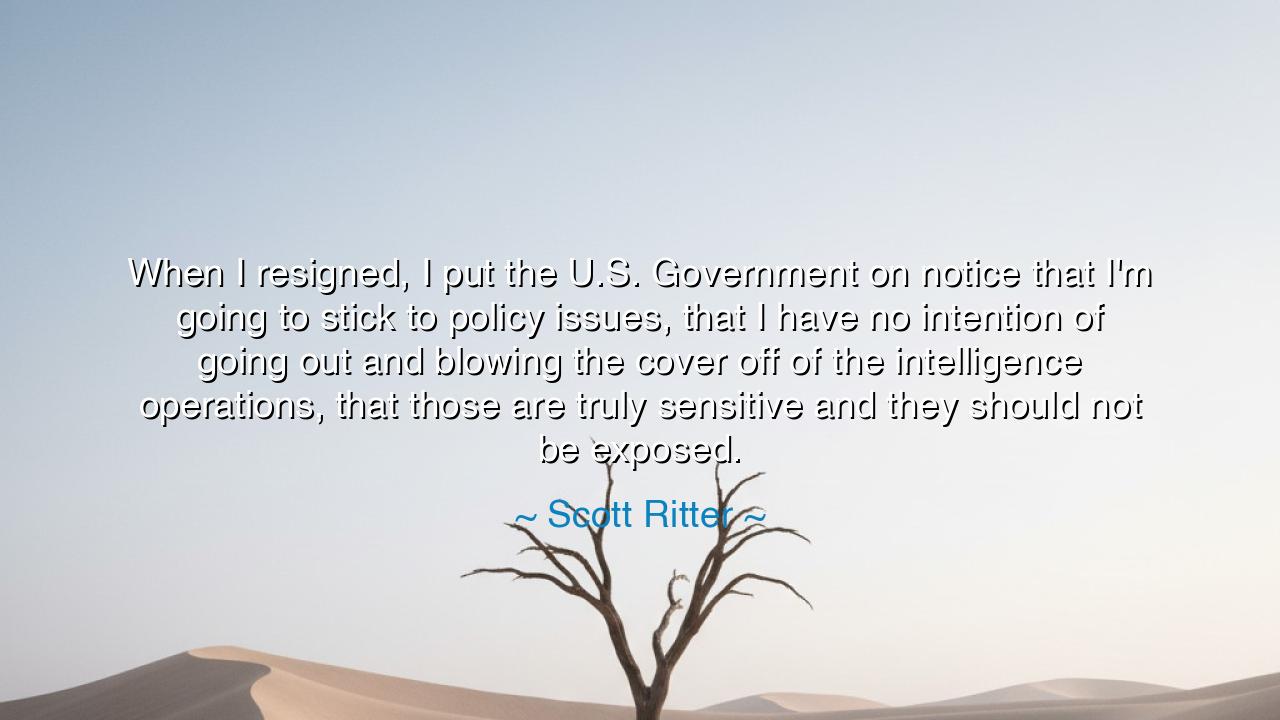
When I resigned, I put the U.S. Government on notice that I'm
When I resigned, I put the U.S. Government on notice that I'm going to stick to policy issues, that I have no intention of going out and blowing the cover off of the intelligence operations, that those are truly sensitive and they should not be exposed.






The words of Scott Ritter, spoken with the weight of conscience and the precision of a soldier’s honor, reveal the eternal struggle between truth, duty, and restraint: “When I resigned, I put the U.S. Government on notice that I'm going to stick to policy issues, that I have no intention of going out and blowing the cover off of the intelligence operations, that those are truly sensitive and they should not be exposed.” These are not the words of rebellion, but of discipline — the declaration of a man who has walked the perilous line between loyalty and integrity, between the right to speak and the duty to protect. In them echoes an ancient wisdom: that knowledge is a sacred trust, and that even truth must be spoken with discernment, lest it destroy what it seeks to defend.
Scott Ritter, a former Marine Corps intelligence officer and United Nations weapons inspector, became a public figure during the years leading up to the Iraq War. He had seen from within the corridors of power the complexity of espionage and diplomacy — the dance of shadows upon which nations depend for survival. When he resigned, it was not in defiance of his country, but in fidelity to a higher principle — to truth, but tempered with responsibility. His words remind us that there are some truths which, if carelessly revealed, can endanger lives, compromise operations, and unravel the delicate fabric that keeps nations from chaos. Ritter’s choice to speak of policy, not secrets, shows the wisdom of one who knows that power must be balanced by conscience, but conscience must also be guided by prudence.
The ancients understood this struggle well. In the courts of kings and empires, those who bore knowledge of statecraft carried both power and peril in their hearts. Consider the story of Marcus Tullius Cicero, the Roman orator and statesman who, in his pursuit of justice, revealed too much of Rome’s internal fractures. His words were noble, but his candor cost him his life and accelerated the Republic’s decline. The lesson is eternal: to speak truth is sacred, but to wield it without measure can be ruinous. Ritter’s restraint — his refusal to “blow the cover off intelligence operations” — thus places him in the lineage of those who understand that the wise man is not merely one who knows, but one who knows when and how to speak.
There is also in his words a tone of reverence — a recognition that certain things are “truly sensitive”, and must be guarded for the sake of others. This humility before knowledge is rare in an age that prizes revelation above responsibility. In ancient Egypt, scribes who served the Pharaoh were entrusted with divine secrets — not to flaunt, but to preserve. The sacred writings, the formulas, the maps of the heavens — these were shared only with those deemed ready, for the ancients knew that knowledge misused could destroy the very order of the world. Ritter’s statement carries this same sacred caution: that the guardian of truth must discern the difference between illumination and exposure, between bringing wisdom to light and setting fire to the temple of order.
Yet Ritter’s words are not an argument for silence, but for ethical courage. To “stick to policy issues” is to direct one’s voice where it can do good — to challenge decisions, not destroy institutions. In this, he honors the balance between loyalty and accountability that every servant of the public must hold. He chose not the easy path of sensationalism, but the harder one of integrity — speaking truth to power without betraying trust. In a time when many confuse exposure with courage, his example reminds us that real courage often lies in restraint, in protecting what must remain hidden while still confronting what must be changed.
Think also of Socrates, who in Athens questioned the morality of power and the wisdom of law, but refused to flee when condemned. He could have broken his oath to the city, but he did not; he chose to honor the principle of duty to the state, even in dissent. So too does Ritter’s reflection embody this same dual allegiance — the duty to truth, and the duty to protect the mechanisms that make truth possible. His understanding that certain intelligence operations must remain undisclosed is not weakness, but wisdom: for there can be no peace, no diplomacy, no stability in a world where all secrets are stripped bare.
Thus, the lesson of Scott Ritter’s words is both moral and timeless: truth is sacred, but it is not absolute. It must be guided by justice, by love of country, and by the humility to know when revelation becomes destruction. To the wise, transparency and secrecy are not opposites, but partners — each necessary to preserve the harmony of society. The call to integrity is not a license to expose all things, but an invitation to wield truth like a sword with a careful hand.
So, dear listener, let this wisdom guide you: when you are entrusted with knowledge — whether in your work, your family, or your life — treat it with reverence. Speak when your words will heal or enlighten, and be silent when speech would harm or betray. Like Ritter, honor the balance between courage and caution. For the mark of the truly wise is not in how loudly they speak, but in how faithfully they guard the sacred trust of truth — revealing only what uplifts, and protecting what must remain veiled for the greater good of all.






AAdministratorAdministrator
Welcome, honored guests. Please leave a comment, we will respond soon